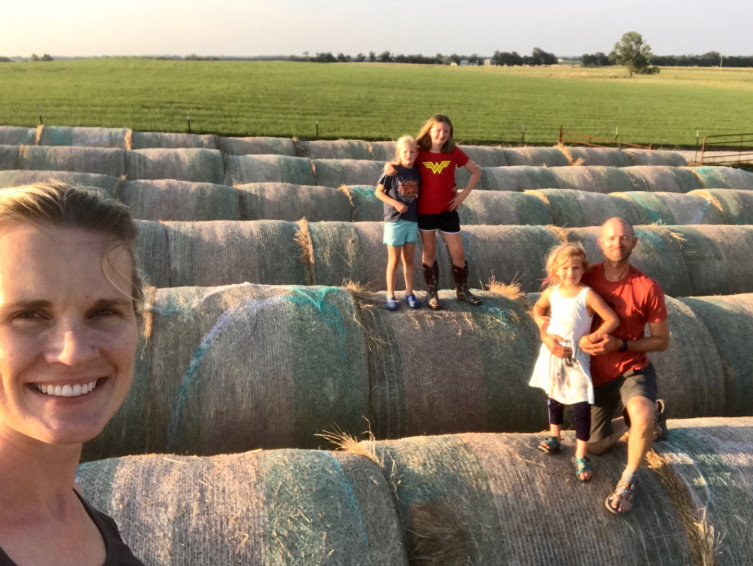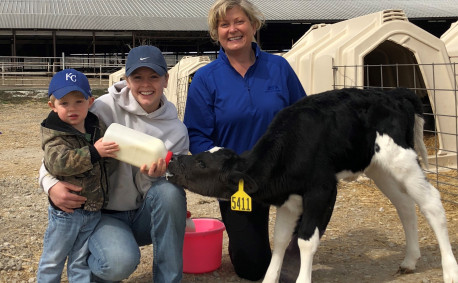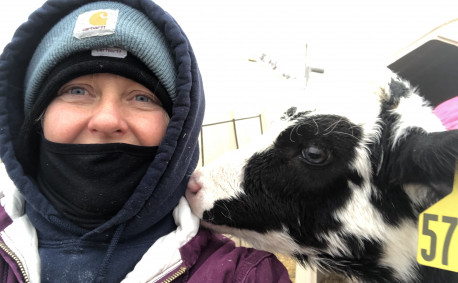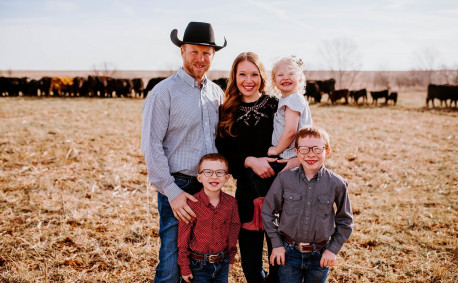A Life of Purpose in Southeast Kansas
“A life with a purpose is a life worth living.”
Frances Graves loves this quote. It’s a guiding principle for the Kansas mother, wife and farmer.
“This is very meaningful to me in every aspect of our lives — both as a motivation for why we left the city for the farm, and how we think of the animals we raise for food on our farm,” she said.
Frances grew up in Johnson County and lived in Lawrence for 11 years. She met her husband, Kris, in college. He came from a farming family — he was the fifth generation — but he wasn’t interested in becoming a farmer himself. He was a historian. When the couple had their first daughter, life shifted. Of course, all parents experience a big change when they welcome a child into the family, but this was different.
“Parenthood really caused us to analyze our priorities — what we wanted to do, how we wanted to spend our time, how involved we wanted to be with our children,” Frances said. “We felt that pull to slow down, be more connected to family and the environment.”
They didn’t want to wake up, rush out the door to work while their daughter was in daycare, have a few precious moments at the end of the day to connect before going to bed and starting all over the next day. So, they decided to move back to Kris’s family’s farm.
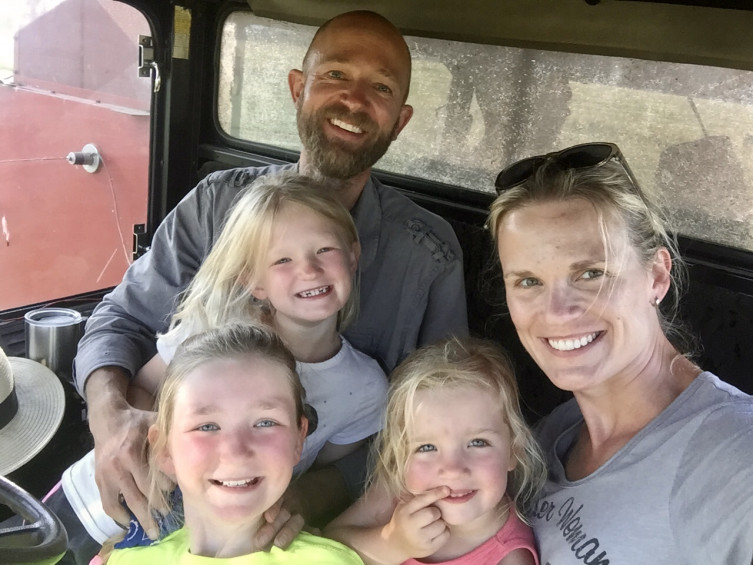 Graves Land and Cattle in Bartlett, near Parsons, in southeast Kansas, raises stocker cattle. Stocker cattle are young steers that have been weaned from their mothers but aren’t mature enough to go to a feedlot. It’s an in-between stage, like the K-12 years for kids. They’re not babies and they’re not adults. And the Graveses feel like their teachers.
Graves Land and Cattle in Bartlett, near Parsons, in southeast Kansas, raises stocker cattle. Stocker cattle are young steers that have been weaned from their mothers but aren’t mature enough to go to a feedlot. It’s an in-between stage, like the K-12 years for kids. They’re not babies and they’re not adults. And the Graveses feel like their teachers.
“We have them in that middle phase of life,” Frances said. “We teach them how to eat and drink, teach them how to line up and move around as a herd. We get them used to the farm. We help them grow up.”
There’s a lot of care in what they do, and the work requires keen observation and gentle handling of the animals.
“We make sure they’re well taken care of and healthy,” Frances said. “We know if an animal is limping or has something in its eye.”
A major part of their caretaking is providing a proper diet for the animals. Frances said their emphasis is on farming grass as much as handling cattle. They care for their prairie pastures to ensure the cattle’s food supply is well maintained.
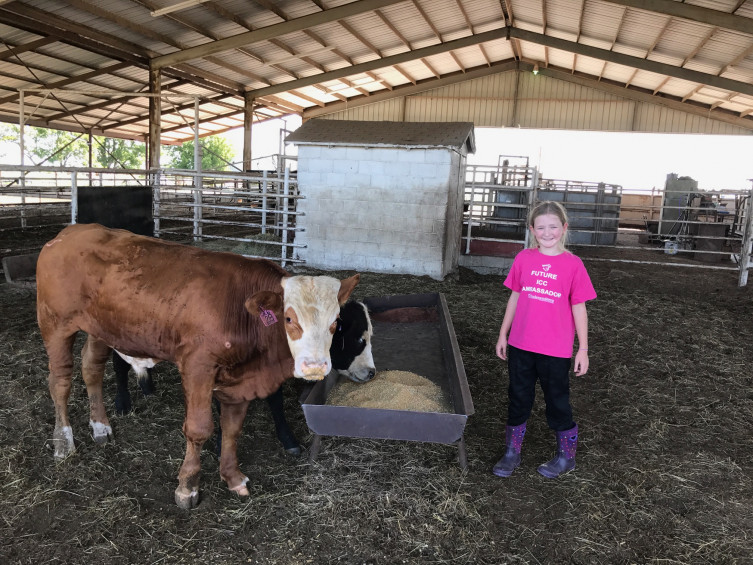 Many farmers focus on the genetics of their herds — raising specific breeds for their physical traits, which translate into the marketing for their meat (think Black Angus steak). The Graveses aren’t breeders, so they focus less on genetics. They made the business decision to buy multiple breeds.
Many farmers focus on the genetics of their herds — raising specific breeds for their physical traits, which translate into the marketing for their meat (think Black Angus steak). The Graveses aren’t breeders, so they focus less on genetics. They made the business decision to buy multiple breeds.
“My father-in-law saw a window of opportunity in taking these cattle that are a little more hodgepodge. Because we take such good care of them, we’re able to make a business from it,” she said. “We’re proud of our cattle and my father-in-law has built such a good reputation.”
When their cattle get to be 800 pounds, they sell them to a feedlot where they are “finished,” meaning they’re put on a new diet to help them gain weight and allow marbling before they’re harvested.
To some, the end of life phase can seem cruel, but Frances doesn’t see it that way. She goes back to that quote about purpose. The cattle were bred to be our food — that’s their purpose. And the Graves family is dedicated to their care, to shepherd them on that journey — that’s their purpose.
“Everything serves a purpose and these animals have a role. That doesn’t mean we’re not taking care of them,” she said. “We’re caretaking their lives through these stages of development. There’s a lot of honor in having that position, in serving our food supply.”
Before becoming a farmer, Frances was a vegetarian. Living on the farm helped her understand that distinction.
“I realize now, having moved to the farm and becoming a caretaker to a cattle herd, farmers are some of the most compassionate people,” she said. “I’m really thankful I’ve had this whole experience.”
Frances confessed she didn’t always feel so thankful. Going from city life to farm life was tough at first.
“It was a culture shock when we first moved here,” she said. “I missed a lot about living in the city in the beginning. Now, I love the peace. I love the space. I don’t think I could go back. I don’t think I could live that life again, of being in a car so often, of being in a closed place, of not being able to go outside.”
There are lots of resources readily available in the city — shopping, dining and more. But Frances has come to value the self-reliance necessary in country life.
“Living in an isolated area, you take care of yourself and your neighbors. You get used to having to meet your own needs,” she said. “It’s a very special culture of the small town. I’m not sure I would appreciate it as much if didn’t have the perspective of other places.”
And as Frances reflects about their main reason for moving — their family, which has grown from one to three daughters — she feels the tradeoffs of city amenities for farm life were worth it.
“I think the girls love having the space to roam. I think they love being connected to grandparents. I think they love having a sense of place and responsibility, not just of homework, but the animals and land we take care of,” she said.
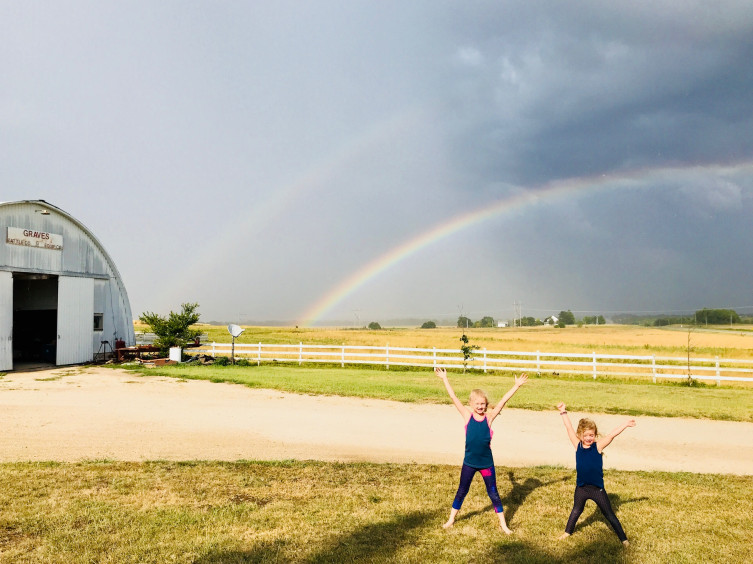 Frances knows there’s a divide between farm and non-farm life. She’s lived both sides. But, if she could get everyone to understand one thing, it would be our similarities are greater than our differences.
Frances knows there’s a divide between farm and non-farm life. She’s lived both sides. But, if she could get everyone to understand one thing, it would be our similarities are greater than our differences.
“I wish people didn’t think of themselves in such divided terms. Liberal environmentalist and commercial farmer — it’s not as black and white as the world might think,” she said. “We’re all concerned about taking care of ourselves and our families.”
To get to know more about Frances, her family and their farm, follow them on Facebook or visit their website, where they’ll be selling direct to consumers soon.
More About
What’s your favorite thing about Kansas?
"I love the spirit of creativity and problem-solving that Kansans have. We get out there and make things happen for ourselves and we solve problems and we take care of each other. I think that’s really unique. I’m such a proud Kansan."
What’s your favorite food?
"That’s a hard one for a mom, because family meals dominate now. We make a lot of spaghetti and tacos and they’re such crowd pleasers. But I love Indian food. It’s my absolute favorite. And the beef we raise. We eat our own and I think it tastes better than anything at the grocery."

